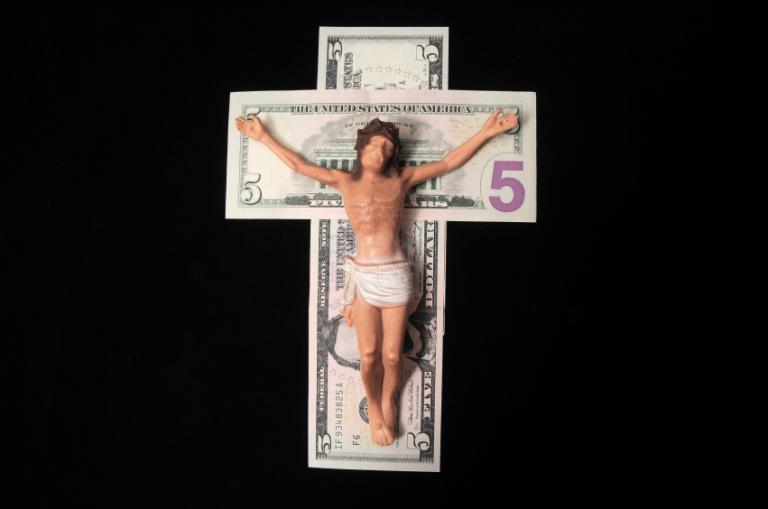 Perhaps you have seen the Simpsons episode titled “She of Little Faith.” Homer is responsible for accidentally burning down the church that he and his family attend. The church community sells their collective soul to the nuclear power plant owner (who is the devil in disguise) to refinance and rebuild the sanctuary. The result is a “faith-based emporium” with comfortable theater seating for religious consumers, a pulpit bearing a screen for advertisements, and a money-changing booth.
Perhaps you have seen the Simpsons episode titled “She of Little Faith.” Homer is responsible for accidentally burning down the church that he and his family attend. The church community sells their collective soul to the nuclear power plant owner (who is the devil in disguise) to refinance and rebuild the sanctuary. The result is a “faith-based emporium” with comfortable theater seating for religious consumers, a pulpit bearing a screen for advertisements, and a money-changing booth.
The satirical account in the Simpsons episode draws attention to the problem we face today, as churches struggle to engage religious consumers who approach religion as a commodity or consumer product. Churches that cater to this mind-set and the related appetites hurt ecclesial communion and mission.
I was asked to speak to this matter several years ago for a Wall Street Journal article titled “The Mystery Worshipper” by Alexandra Alter (here is the link to the article). The article considers how some churches are following the example of department stores and restaurants that hire mystery shoppers and mystery diners to rate them.
Evaluating churches as if they were restaurants or hotels might encourage people to choose their church not according to its theology, but based on which one has the best lattes or day care, says Paul Metzger, professor of theology at Multnomah Biblical Seminary in Portland, Ore. “We tend to look for religion or spirituality that will give us what we want, when we want it,” Prof. Metzger says. “There’s a pressure for the church to be something that the church is not.”
Churches are not faith-based emporiums, nor are Christians connoisseurs by nature. When we turn churches and Christians into these things, we are in danger of distorting ecclesial and Christian identity, dividing churches over competition for religious consumers, including those of different ethnic and economic backgrounds, and weakening churches’ prophetic import for addressing social problems in our society today. With the latter danger in mind, we must also guard against reducing the church to a utilitarian (possibly even consumer) instrument for addressing social problems, for as Stanley Hauerwas has argued, “the church does not have a social ethic; the church is a social ethic.[1]
C. S. Lewis addresses these problems in The Screwtape Letters, where the demon Screwtape encourages his nephew Wormwood to turn his target victim into a church shopper or connoisseur if he cannot keep him from attending church. In opposition to Screwtape and Wormwood, Lewis maintains that churches should promote “unity of place”—not a unity of “likings” and should seek to bring “people of different classes and psychology together in the kind of unity” that the demons’ divine enemy (God) desires.[2]
I am thankful that Martin Luther King, Jr. did not view the church as a faith-based emporium. Rather, he viewed Ebenezer Baptist Church as the Ark of the Covenant that he took with him into his civil rights battles:
King would…come to view the church — this “Afro-Baptist sacred cosmos” — as the Ark of the Covenant, which he would take with him into battle as leader of the civil rights movement. “Ebenezer’s worship (and worship space) not only built a world for Negro survival but institutionalized a permanent critique of a world in which survival is all one can hope for” (Lischer, p. 17). In King’s view, the sacred space of the sanctuary can be revolutionary. It stands against the principalities as a check on their powers, serving as a visible sign of God’s eschatological kingdom.[3]
Christ’s church’s identity and calling serves as a prophetic challenge to demonic divisions and is a catalyst for bringing people together as beloved community. What are our various churches visible signs of today—faith-based emporiums or Christ’s eschatological kingdom?
[1] See Stanley Hauerwas, The Hauerwas Reader, ed. John Berkman and Michael Cartwright (Durham, NC: Duke University Press, 2001), p. 111.
[2]C. S. Lewis, The Screwtape Letters, with “Screwtape Proposes a Toast,” rev. ed. (New York: Macmillan Publishing Company, 1982), pp. 72-73.
[3]This indented statement is taken from Paul Louis Metzger, Consuming Jesus: Beyond Race and Class Divisions in a Consumer Church (Grand Rapids: Eerdmans, 2007), p. 122. There I quote from Richard Lischer, The Preacher King: Martin Luther King, Jr. and the Word that Moved America (New York: Oxford University Press, 1995), p. 17. For an extensive discussion of the themes set forth in this blog post, see chapter six of Consuming Jesus titled “Reordering the Church’s Outreach: Overcoming Market Forces and Building Beloved Community.”













